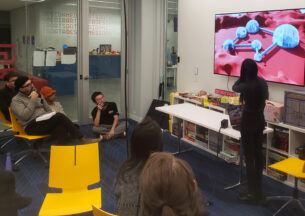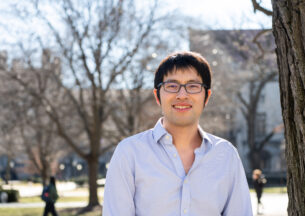PhD Student Kevin Bryson Receives NSF Graduate Research Fellowship to Create Equitable Algorithmic Data Tools
Second-year PhD student Kevin Bryson was recently selected this month for the prestigious NSF Graduate Research Fellowship, which “recognizes and supports outstanding graduate students who have demonstrated the potential to be high achieving scientists.” Bryson will receive an annual stipend all three years of his fellowship, supporting his research on creating tools to help data scientists develop more ethical models.
In September 2021, Bryson joined UChicago’s PhD program in Computer Science, where he is advised by Assistant Professor Blase Ur. Previously, Bryson studied computer science, mathematics, and Japanese at Morehouse College, where he first became interested in the societal impacts of his technical work. He explained, “Being at Morehouse and experiencing education at an HBCU (historically black college or university), I gained both technical skills and a unique education on injustices in society.I felt unfulfilled at other jobs, including working in industry as a data scientist, because the only motivation was profit. My PhD research is a way to do work I find interesting technically that also impacts society.”
 During his first year at UChicago, Bryson contributed to two research projects that set the stage for what he will be working on during the fellowship. The first (Explaining Why: How Instructions and User Interfaces Impact Annotator Rationales When Labeling Text Data) was a study investigating how user interfaces impact how humans label data used for machine learning. The second project developed and evaluated a new system called Retrograde that makes data scientists who are training machine learning models more aware of potential ethical issues in their data and approach.
During his first year at UChicago, Bryson contributed to two research projects that set the stage for what he will be working on during the fellowship. The first (Explaining Why: How Instructions and User Interfaces Impact Annotator Rationales When Labeling Text Data) was a study investigating how user interfaces impact how humans label data used for machine learning. The second project developed and evaluated a new system called Retrograde that makes data scientists who are training machine learning models more aware of potential ethical issues in their data and approach.
“My research is a natural progression from the Retrograde project,” said Bryson. “We see that when people are made aware of these issues, they want to find ways to mitigate them so they will have better data for future models or tasks. The question is how can we make these methods readily available to data scientists so they can actually do that?”
Bryson’s research moving forward will focus on creating new methods and tools for data scientists that help them make more ethical decisions in their exploration and modeling of data, especially in critical decision-making domains like healthcare, loans, and housing. Current practices in processing data can bring about biased samples, further perpetuating issues like marginalization.
“For example, if you have a dataset where large amounts of income data are missing, one strategy for people to deal with this is to remove those rows,” explained Bryson. “Retrograde can identify if this missing data is highly correlated with, for instance, being a woman or person of color. Then we can point out that you’re removing large amounts of data from those people who are probably already under-sampled.”
The work falls in line with his passion to pursue equity and algorithmic justice. Alongside his research, Bryson has spent two summers as a teaching assistant for the Collegiate Scholars Program, which gives advanced STEM opportunities to underrepresented minorities in local high schools. He also partnered with a professor from Morehouse College to design a workshop for high school students that connects math and data science to real-world contexts.
“I introduced students to data science and programming using the context of a dataset containing Texas death row inmates to simultaneously educate students on the injustices within the criminal justice system. We looked back on records dating back to the 1970’s and talked about how the cataloging and commodification of people in the criminal justice system has evolved to now, where in certain states, algorithms may be used to predict your risk of recidivism. Connecting these sorts of disparate things in an educational way is one of my biggest passions.”
To learn more about the NSF Graduate Research Fellowship, you can visit the organization’s website here.













